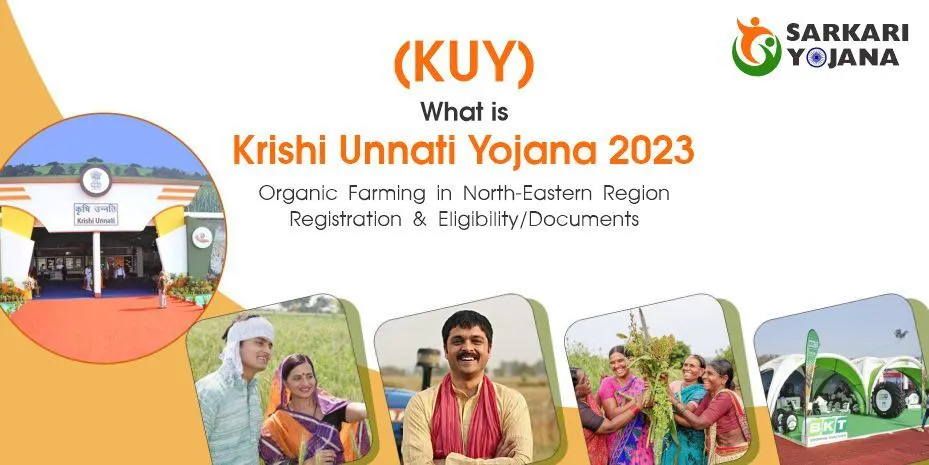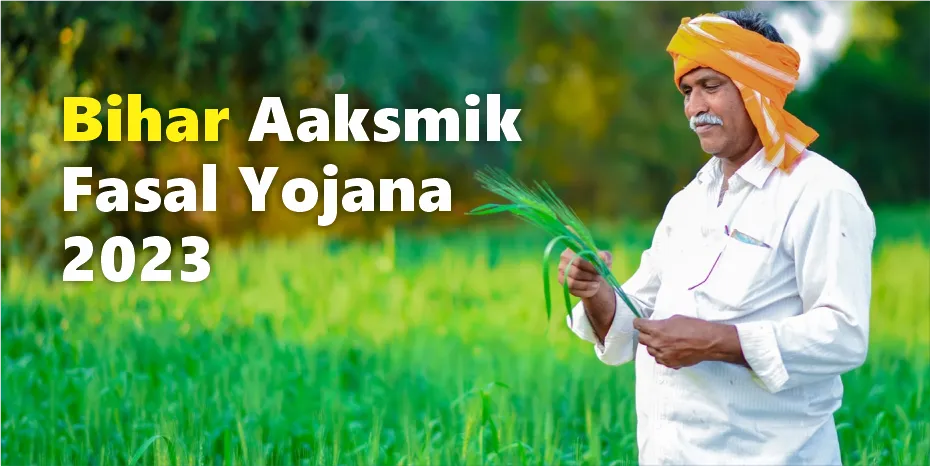The Krishi Unnati Yojana (KUY) is a central sector scheme launched by the Ministry of Agriculture and Farmers Welfare to promote organic farming in the North Eastern Region of India. The scheme aims to develop certified organic value chains for various crops and livestock products and link the growers with the consumers. The scheme also provides support for infrastructure creation, certification, branding, marketing, and capacity building of the farmers and enterprises involved in organic farming.
The Krishi Unnati Yojana – KUY 2023 covers eight states of the North Eastern Region, namely Arunachal Pradesh, Assam, Manipur, Meghalaya, Mizoram, Nagaland, Sikkim, and Tripura. The scheme has been implemented since 2015-16 and has been extended till 2023 with an allocation of Rs. 400 crore.
Contents
- 0.1 What is Krishi Unnati Yojana (KUY) 2023
- 0.2 How to Apply for Krishi Unnati Yojana (KUY) 2023
- 0.3 Contact Details and Important Link for KUY-2023
- 1 FAQs on Krishi Unnati Yojana (MOVCDNER)
- 1.0.0.1 What is Krishi Unnati Yojana (MOVCDNER)?
- 1.0.0.2 What are the objectives of the scheme?
- 1.0.0.3 Which states are covered under the scheme?
- 1.0.0.4 What are the benefits of the scheme for farmers?
- 1.0.0.5 What are the eligibility criteria for availing of the scheme?
- 1.0.0.6 How can a farmer apply for the scheme?
- 1.0.0.7 What is the duration and budget of the scheme?
What is Krishi Unnati Yojana (KUY) 2023
The KUY 2023 acknowledges the potential for organic farming in the North Eastern Region, which has a wealth of biodiversity, varied agro-climatic conditions, and little usage of conventional pesticides and fertilizers.
The Krishi Unnati Scheme 2023 seeks to develop certified organic production in a value chain mode to connect farmers with consumers and to support the development of the entire value chain beginning with inputs, seeds, and certification, to the creation of facilities for collection, aggregation, processing, marketing, and brand building initiatives.
The programme includes Arunachal Pradesh, Assam, Manipur, Meghalaya, Mizoram, Nagaland, Sikkim, and Tripura as part of its eight North Eastern member states.
Benefits & Features of Krishi Unnati Scheme 2023
Krishi Unnati Yojana (KUY) offers various benefits and features to the farmers and enterprises involved in organic farming in the North Eastern Region of India.
Some of the major benefits and features are:
- Development of certified organic production:
This agriculture scheme supports the farmers to adopt organic farming practices and obtain organic certification for their crops and livestock products. The scheme also provides necessary infrastructural, technical, and financial support for on-farm input production, training on the package of practices, and facilitating certification services to farmers.
- Creation of value chain from inputs to marketing:
The Krishi Yojana aims to develop a crop commodity-specific organic value chain and address gaps in organic crop production, wild crop harvesting, organic livestock management, and processing handling and marketing of organic agricultural products. The scheme also facilitates partnerships between farmers and organic businesses: Local enterprises and/or Farmer Producer Companies based on back-to-back long-term trade relations with clients in domestic and export markets.
- Empowerment of producers:
The govt agriculture scheme empowers the producers with program ownership by organizing them into Farmer Interest Groups (FIGs) with the final aim to federate into farmer-producer organizations/ companies. The scheme also provides enabling environment for project initiatives and development programs with the necessary support for organic value chain development and creating market access.
- Replacement of conventional farming:
The KUY 2023 replaces the conventional farming/subsistence farming system with a local resource-based, self-sustainable, high-value commercial organic enterprise. The scheme also promotes the conservation of natural resources, biodiversity, and the environment through organic farming practices.
Organic Farming Commercial Chain Establishment
- Development of commodity-specific commercial organic value chain:
The Krishi Unnati Yojana develops a commodity-specific commercial organic value chain under an integrated and concentrated approach with end-to-end facilities for production, processing, storage, and marketing. The scheme also develops organic parks/zones with facilities for collection, aggregation, value addition, processing, storage, and market linkages for specific commodities requiring capital-intensive technology.
- Development of NER products as brands/labels:
This agriculture scheme develops NER products as brands/labels through brand building and facilitating stronger marketing access under the ownership of growers’ organizations/ companies. The scheme also enhances the competitiveness and profitability of organic products in domestic and international markets.
- Creation of state-specific lead agency:
This Krisi Yojan creates a state-specific lead agency (Organic Commodity Board or Organic Mission) for coordinating, monitoring, supporting and financing the development and operationalization of the entire value chain. The scheme also ensures convergence and synergy with other schemes and programs related to organic farming in the region.
Eligibility & Required Documents Krishi Unnati Yojana
Krishi Unnati Yojana (KUY) has certain eligibility criteria and required documents for the farmers and enterprises who want to avail the benefits of the scheme.
The eligibility and required documents are:
- For farmers:
The farmers who want to participate in the scheme should be from the North Eastern Region of India and should have a minimum of 0.5 hectares of cultivable land under organic farming. The applicants should also form Farmer Interest Groups (FIGs) with at least 20 members each and register themselves under the scheme. The citizens should also have a bank account and an Aadhaar card.
- For enterprises:
The enterprises that want to partner with the farmers and provide services such as collection, aggregation, processing, marketing, and branding of organic products should be registered as local enterprises or Farmer Producer Companies (FPCs) under the Companies Act, 2013. The enterprises should also have a valid PAN card, GST registration, bank account, and organic certification.
- For organic parks/zones:
The organic parks/zones are developed for specific commodities requiring capital-intensive technology and facilities for value addition, processing, storage and market linkages. The organic parks/zones should be within a radius of 25 km from the clusters developed and registered under the scheme. The financial assistance for the organic parks/zones is restricted to 75% of the total financial outlay (TFO) or maximum budget allocation (Rs. 11.25 lakh per unit) whichever is less.
How to Apply for Krishi Unnati Yojana (KUY) 2023
Krishi Unnati Yojana (KUY) has a simple and transparent application process for the farmers and enterprises who want to avail the benefits of the scheme. The application process is:
Farmers: Application Form
- The farmers who want to participate in the scheme should contact the nearest State Agriculture Department or State Organic Commodity Board or State Organic Mission for registration under the scheme.
- The farmers should fill up the application form and submit it along with the required documents such as land records, bank account details, Aadhaar card, etc.
- The farmers should also join the Farmer Interest Groups (FIGs) formed under the scheme and get their land verified and certified for organic farming.
Enterprises: Application Form
- The enterprises who want to partner with the farmers and provide services such as collection, aggregation, processing, marketing and branding of organic products should contact the State Agriculture Department or State Organic Commodity Board or State Organic Mission for registration under the scheme.
- The enterprises should fill up the application form and submit it along with the required documents such as registration certificate, PAN card, GST registration, bank account details, organic certification, etc.
- The enterprises should also sign a memorandum of understanding (MoU) with the farmers or FIGs or FPCs for long-term trade relations.
Organic Parks/Zones: Application Form
- These are developed for specific commodities requiring capital-intensive technology and facilities for value addition, processing, storage and market-linkages.
- The organic parks/zones are developed by the State Agriculture Department or State Organic Commodity Board or State Organic Mission in collaboration with the private sector or NGOs or FPOs or FPCs or cooperatives or SHGs etc.
- The organic parks/zones should submit a detailed project report (DPR) along with the required documents such as land records, bank account details, market feasibility study, etc to the Ministry of Agriculture and Farmers Welfare for approval and financial assistance.
Contact Details and Important Link for KUY-2023
This Agriculture scheme Krishi Unnati Yojana (KUY) has provided the following contact details and important link for the farmers and enterprises who want to know more about the scheme or have any queries or grievances related to the scheme.
Contact Details for Krishi Unnati Yojana – KUY
The farmers and enterprises can contact the following authorities for any information or assistance related to the scheme:
- Ministry of Agriculture and Farmers Welfare:
The ministry is the nodal agency for implementing the scheme at the central level. The farmers and enterprises can contact the ministry at:
- Address: Krishi Bhawan, Dr. Rajendra Prasad Road, New Delhi-110001
- Phone: 011-23383370 / 23782691
- Email: agricoop[at]nic[dot]in
- Website: https://agricoop.nic.in/
State Organic Commodity Board or State Organic Mission
The state authorities are responsible for coordinating, monitoring, supporting, and financing the development and operationalization of the entire value chain under the scheme at the state level.
The farmers and enterprises can contact their respective state authorities at:
- Arunachal Pradesh: https://www.arunachalpradesh.gov.in/departments/agriculture/
- Assam: https://agri-horti.assam.gov.in/
- Manipur: https://agrimanipur.gov.in/
- Meghalaya: https://megagriculture.gov.in/
- Mizoram: https://agriculture.mizoram.gov.in/
- Nagaland: https://agringl.nic.in/
- Sikkim: https://www.sikkimagrisnet.org/
- Tripura: https://agri.tripura.gov.in/
Important Links for Krishi Unnati Yojana (KUY)
The farmers and enterprises can visit the official website of the scheme at https://www.myscheme.gov.in/schemes/kuy-movcdner for more details about the scheme, such as mission objectives, project strategies, financial assistance, the application process, status check, etc.
The website also provides various documents related to the scheme, such as guidelines, operational manuals, progress reports, success stories, etc.
FAQs on Krishi Unnati Yojana (MOVCDNER)
Checkout frequently asked questions and their answers related to Krishi Unnati Yojana here:
What is Krishi Unnati Yojana (MOVCDNER)?
Krishi Unnati Yojana (MOVCDNER) is a central sector scheme launched by the Ministry of Agriculture and Farmer Welfare to promote organic farming and value chain development in the North Eastern Region of India.
What are the objectives of the scheme?
The scheme aims to:
- Develop crop-specific organic production clusters with necessary infrastructural, technical, and financial support.
- Facilitate partnerships between farmers and organic businesses for long-term trade relations with domestic and export markets.
- Provide an enabling environment for project initiatives and development programs with the necessary support for organic value chain development and market access.
- Empower producers with program ownership by organizing them into Farmer Interest Groups (FIGs) and farmer-producer organizations/ companies.
- Replace conventional farming/subsistence farming system with the local resource-based, self-sustainable, high-value commercial organic enterprise.
- Develop a commodity-specific commercial organic value chain with end-to-end facilities for production, processing, storage, and marketing.
- Develop NER products as brands/labels through brand building and facilitating stronger marketing access under the ownership of growers’ organizations/ companies.
- Create state-specific lead agency (Organic Commodity Board or Organic Mission) for coordinating, monitoring, supporting, and financing the development and operationalization of the entire value chain1.
Which states are covered under the scheme?
The scheme covers eight states of the North Eastern Region, namely Arunachal Pradesh, Assam, Manipur, Meghalaya, Mizoram, Nagaland, Sikkim, and Tripura1.
What are the benefits of the scheme for farmers?
The scheme provides various benefits for farmers such as:
- Training on organic farming practices and certification services.
- Access to quality inputs, seeds, and certification services.
- Linkage with enterprises that can provide collection, aggregation, post-harvest processing, and marketing services.
- Participation in decision-making and governance of the value chain through FIGs and farmer-producer organizations/ companies.
- Higher-income and profitability from organic products due to premium prices and reduced input costs.
- Enhanced soil health and biodiversity conservation due to organic farming methods.
What are the eligibility criteria for availing of the scheme?
The eligibility criteria for availing of the scheme are:
- The farmer should be a resident of one of the eight NER states covered under the scheme.
- The farmer should be willing to adopt organic farming practices and undergo a certification process as per National Programme for Organic Production (NPOP) standards.
- The farmer should be a member of a FIG or a farmer-producer organization/ company registered under the scheme.
How can a farmer apply for the scheme?
A farmer can apply for the scheme through the following steps:
- Contact the nearest Krishi Vigyan Kendra (KVK), Agriculture Technology Management Agency (ATMA), or State Department of Agriculture/Horticulture for guidance and registration under the scheme.
- Form or join a FIG or a farmer-producer organization/ company with other interested farmers in the same commodity cluster.
- Submit a detailed project proposal along with necessary documents to the concerned State Implementing Agency (SIA) or State Mission Directorate (SMD) for approval.
- Receive training on organic farming practices and certification services from the SIA/SMD or their designated agencies.
- Implement the project activities as per the approved project proposal with regular monitoring and evaluation by the SIA/SMD or their designated agencies.
What is the duration and budget of the scheme?
The scheme was launched in 2015 for implementation during the 12th plan period (2012-17) with an outlay of Rs. 400 crore. It has been extended till 2023 with an additional allocation of Rs. 225 crore. The total budget of the scheme is Rs. 625 crore.





